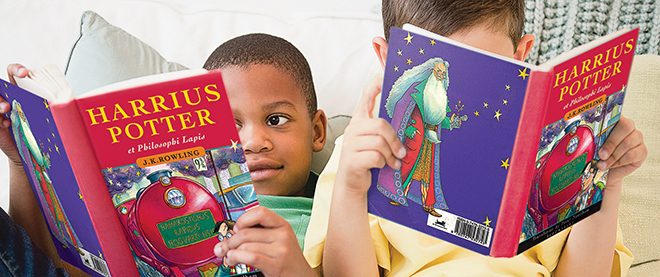Harrius Potter and the Latin revival
Thousands of Finns and Angelina Jolie can’t be wrong about what Latin can do for you
Photo illustration by Sarah MacKinnon
Share

Earlier last month the New York Times ran a feature on Finnish state radio’s weekly Nuntii Latini, or “Latin News,” an international news summary broadcast in the ancient, classical language. Tens of thousands were tuning in, many on iPads, the paper reported. As it turns out, Nuntii Latini has been on air for 24 years; its existence is not exactly breaking news. Still, the story couldn’t be more timely. Everywhere, Latin is rising from the grave: the Circulus Latinus Lutetiensis, or “Paris Latin Circle,” is one of a growing number of groups—real and online—gathering to chat in Latin at cafés and bars; Twitterati joust over usage on @latinlanguage; Ovid has his own Facebook page; and the recent season finale of HBO phenom Girls had a character announcing his plan to complete his Ph.D. in Latin studies to impress his girlfriend and show her he has a “bright future.”
It took Latin’s virtual disappearance for us to realize its relevance. Canadian high schools stopped making Latin study mandatory in the ’60s; classical education was deemed irrelevant and, worse, “Eurocentric.” Even the Catholic Church dropped Latin from official mass. Time only seemed to reinforce its irrelevance: who needs grammar, verb declension or vocabulary skills to text “r u ok?” Even august Harvard professor and psycholinguist Stephen Pinker trashed Latin in his 2007 book The Language Instinct: “Latin declensional paradigms are not the best way to convey the inherent beauty of grammar,” he wrote. He prefers computer programming and universal grammar on the grounds they are “about living minds and not dead tongues.”
But Latin’s unfamiliarity also made it exotically erudite, as displayed on celebrity tattoos: Angelina Jolie’s Quod me nutrit me distrust (“What nourishes me also destroys me”) on her stomach, Ut amem et foveam (“So that I love and cherish”) on David Beckham’s arm. Knowing Latin even conferred celebrity status: Italian reporter Giovanna Chirri became an instant star with her scoop that Pope Benedict XVI planned to retire.
The formal, stately language offers a bracing antidote in a culture of oversharing: there’s no gushing in Latin. It’s also a civilization anchor, writes Henry Mount, author of Amo, Amas, Amat and All That: How to Become a Latin Lover, who describes the deep pleasure of knowing “the bones and roots of a language.”
There are mind-expanding benefits as well. A 1979 paper by University of Chicago professor Nancy Mavrogenes found studying Latin was of particular value to children from poor backgrounds. Learning about Roman life and mythology opens up “new symbolic worlds,” she wrote. Certainly the language was central to the magic of J.K. Rowling’s Harry Potter books, which use Latin names and spells—and made the language accessible to a new generation with translations such as Harrius Potter et Philosophi Lapis.
Latin hones cerebral muscles, as revealed in a newly rediscovered 1981 study by classics professor Richard LaFleur that shows Latin knowledge improves SAT scores, not only in the language section, as one would expect, but in the math too. It is linked to improved “order thinking”—computation, concepts and problem solving. Latin immersion for toddlers could be imminent.
There’s no better advert for learning Latin than Facebook founder Mark Zuckerberg, who attributes his success to studying classics at Phillips Exeter Academy; he listed Latin as one of his languages on his Harvard application and has quoted from Virgil’s The Aeneid at product launches. So it’s fitting that Latin’s revival is playing out online. Facebook introduced Latin as a language option in 2009 (users don’t “poke,” they “pundit”). The Latin Wikipedia offers 89,000 articles. The language’s concise elegance makes it ideal for Twitter, Mount points out: “Translating from English to Latin is like squeezing a concertina shut; from Latin to English is like opening it up again, revealing many and varied English meanings in a single Latin word,” he wrote on his Telegraph blog. He even provided a primer: “LOL” translates as “Magna voce ride,” and “Fac!” is “Just do it!” And we will!